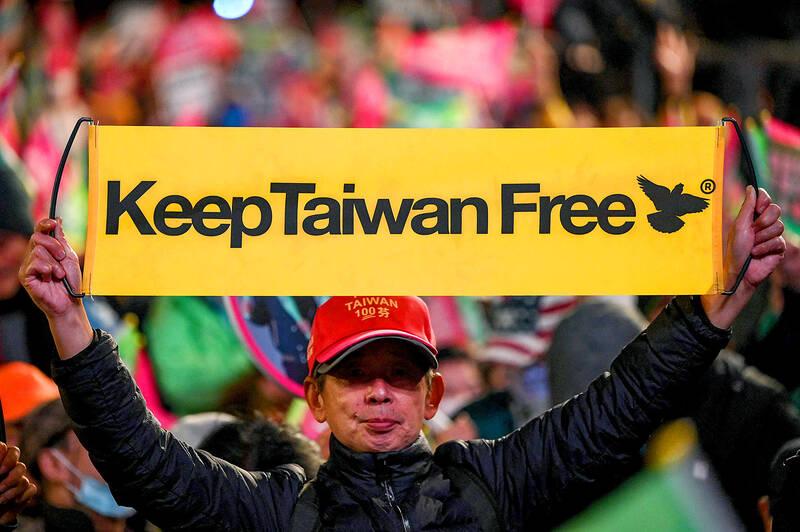Where does our personal politics come from? Does it trace back to our childhood, the views that surround us, the circumstances we are raised in? Is it all about nurture — or does nature have a say through the subtle levers of DNA? And where, in all of this, is the brain?
Scientists have delved seriously into the roots of political belief for the past 50 years, prompted by the rise of sociobiology, the study of the biological basis of behavior, and enabled by modern tools such as brain scanners and genome sequencers. The field is making headway, but teasing out the biology of behavior is never straightforward.
Take a study published last week. Researchers in Greece and the Netherlands examined MRI scans from nearly 1,000 Dutch people who had answered questionnaires on their personal politics.

Photo: Kuan Shu-ping, Taipei Times
NATURE
The work was a replication study, designed to see whether the results from a small 2011 study, bizarrely commissioned by the actor Colin Firth, stood up. Firth’s study, conducted at UCL, reported structural differences between conservative and liberal brains. Conservatives, on average, had a larger amygdala, a region linked to threat perception. Liberals, on average, had a larger anterior cingulate cortex, a region involved in decision-making.
In the latest study of Dutch people, the researchers found no sign of a larger anterior cingulate cortex in liberals. They did, however, find evidence for a very slightly larger amygdala in conservatives. The MailOnline declared evidence that conservatives were more “compassionate,” but later changed their headline noting that the study said nothing about compassion.

Photo: Lo Pei-der, Taipei Times
It is worth looking at the size of the difference the scientists found. When Steven Scholte, a co-author on the study at the University of Amsterdam, did the calculations he found that the amygdala of a conservative was, on average, larger than that of the liberal by the volume of one sesame seed. That is three times smaller than the 2011 study found. In their write-up in iScience, the researchers said it was “critical to approach these findings with caution, to avoid fostering misconceptions and stereotypes.”
What, then, does it mean? Do people with larger amygdalas feel more threatened and so tend towards conservatism? Or do conservatives feel more threatened and develop a slightly larger amygdala as a result?
“It’s impossible to know, using such correlational data, what causes what,” said Diamantis Petropoulos Petalas, the first author on the study.

Photo: Wang Yi-sung, Taipei Times
NURTURE
Social environment, clearly, is one of the most powerful shapers of people’s politics. Political values and beliefs can emerge in early life, particularly when children have politically engaged parents or carers. But political ideology continues to evolve with education and into adulthood as family influence declines. Higher education is consistently linked to more liberal views, especially on issues such as immigration, civil rights and gender equality.
Perhaps most intriguing is the role of genetics. Studies of twins show that political ideology is about 40 percent heritable. But again, what does that mean? These are population-level measures, after all. It is not that 40 percent of a person’s beliefs are shaped by genetics and 60 percent by environment.
“It tells you the extent to which differences between people are due to genetic factors,” said Aaron Weinschenk, a political scientist at the University of Wisconsin, Green Bay. “It’s not an estimate about an individual.”
How genetics affect people’s politics is similarly nuanced. Researchers have not, and do not expect, to find a Tory gene or a Democrat gene. Rather, says Tobias Edwards at the University of Minnesota Twin Cities, genes work indirectly through personality and other factors such as how long people spend in education, their income and intelligence.
POLITICAL GENES?
“We should not expect there to be any specific genes for liberalism, or conservatism, but many genetic variants of infinitesimally small effects, acting indirectly through other traits,” he said.
Earlier this year, Edwards and his colleagues reported that genetics could be used to predict political leanings, with more intelligent siblings in families tending to more liberal politics. But the relationship with party allegiance is far more complex, Edwards said. As he points out, extraordinarily intelligent people are found on both right and left.
Another mistake would be to equate intelligence with sensible values and opinions.
“Looking back across history, we can see intelligent individuals have been attracted to all sorts of different and often contradictory ideas,” Edwards said. “Intellectuals have flirted with and been seduced by dangerous ideologies and tyrannical regimes. Many smart people have believed ideas that are downright stupid.”

The Democratic Progressive Party (DPP), Chinese Nationalist Party (KMT), and the country’s other political groups dare not offend religious groups, says Chen Lih-ming (陳立民), founder of the Taiwan Anti-Religion Alliance (台灣反宗教者聯盟). “It’s the same in other democracies, of course, but because political struggles in Taiwan are extraordinarily fierce, you’ll see candidates visiting several temples each day ahead of elections. That adds impetus to religion here,” says the retired college lecturer. In Japan’s most recent election, the Liberal Democratic Party lost many votes because of its ties to the Unification Church (“the Moonies”). Chen contrasts the progress made by anti-religion movements in

Taiwan doesn’t have a lot of railways, but its network has plenty of history. The government-owned entity that last year became the Taiwan Railway Corp (TRC) has been operating trains since 1891. During the 1895-1945 period of Japanese rule, the colonial government made huge investments in rail infrastructure. The northern port city of Keelung was connected to Kaohsiung in the south. New lines appeared in Pingtung, Yilan and the Hualien-Taitung region. Railway enthusiasts exploring Taiwan will find plenty to amuse themselves. Taipei will soon gain its second rail-themed museum. Elsewhere there’s a number of endearing branch lines and rolling-stock collections, some

Last week the State Department made several small changes to its Web information on Taiwan. First, it removed a statement saying that the US “does not support Taiwan independence.” The current statement now reads: “We oppose any unilateral changes to the status quo from either side. We expect cross-strait differences to be resolved by peaceful means, free from coercion, in a manner acceptable to the people on both sides of the Strait.” In 2022 the administration of Joe Biden also removed that verbiage, but after a month of pressure from the People’s Republic of China (PRC), reinstated it. The American

This was not supposed to be an election year. The local media is billing it as the “2025 great recall era” (2025大罷免時代) or the “2025 great recall wave” (2025大罷免潮), with many now just shortening it to “great recall.” As of this writing the number of campaigns that have submitted the requisite one percent of eligible voters signatures in legislative districts is 51 — 35 targeting Chinese Nationalist Party (KMT) caucus lawmakers and 16 targeting Democratic Progressive Party (DPP) lawmakers. The pan-green side has more as they started earlier. Many recall campaigns are billing themselves as “Winter Bluebirds” after the “Bluebird Action”